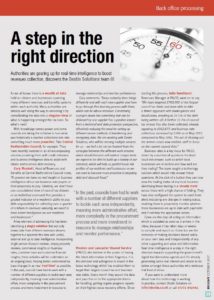 First published as “A step in the right direction” in the October 2017 edition of IRRV Insight magazine.
First published as “A step in the right direction” in the October 2017 edition of IRRV Insight magazine.
As we all know there is a wealth of data held on citizens and businesses spanning many different revenues and benefits systems within each authority. Many authorities are already well along the way to unlocking it by consolidating the data into a singular view of what is happening amongst the tax base. So what’s next?
With knowledge comes power and some Councils are taking the initiative to turn what was historically a reactive collections role into something much more proactive. Take Central Bedfordshire Council for example, they have recently invested in an all-encompassing solution providing them with credit reference and business intelligence data to assist with citizen and business debt recovery.
Gary Muskett, Head of Revenues and Benefits at Central Bedfordshire Council notes “at present we have no real insight or business intelligence about our business rate payers or their propensity to pay. Similarly, we don’t have one consolidated view of Council Tax debtors or an individual scorecard that provides a graded indicator of a resident’s ability to pay. With responsibility for collecting over a quarter of a billion in revenues annually, we need to have better intelligence on our residents and businesses.”
A key element of addressing this has been identifying a single solution that not only draws data from different revenues stream together but appends this data with useful, external and up to date intelligence. Incorporating single person discounts reviews, empty property reviews, commercial insights on NNDR, customer trace and customer financial insights, these activities will be undertaken on an ongoing basis, helping better understand tax base changes in as near real-time as possible. In the past Councils have had to work with a number of different suppliers to tackle each area independently, meaning more administrative effort, more complexity in the procurement process and more investment in resource to manage relationships and monitor performance.
Gary comments “every authority does things differently and with each new supplier you have to go through that learning process with them, which can be labour intensive. Condensing a project down into something that can be delivered by one supplier has a positive impact from a technical and data protection perspective, effectively reducing the need for setting up different secure methods of transferring and encrypting data. We are working with Destin Solutions who will be running multiple services for us, we feel a lot can be learned from the synergies between the different work streams which should become self-evident. Longer term we expect to be able to build up a history of our caseload, which will help us predict future risk profiles of our residents and businesses so we can start to become more proactive in targeting debt and discount fraud.”
Preston and Lancaster Shared Service (PALSS) also believe in the power of having the latest information at their fingertips. It is this mindset and willingness to invest in the latest technology which has enabled them to target their largest council tax and business rate debts. Every month they export the data and pass this onto the appropriate teams for handling, getting regular progress reports on their highest value recovery efforts. Since starting this process, Julie Smethurst, Revenues Manager at PALSS went on to say “we have targeted £750,000 of the largest council tax debts and were able to take a firmer approach with bankruptcies and dissolutions resulting in 23.5% of the debt being written off. A further 21.7% of Council Tax arrears has also been collected already equating to £162,677 and NNDR collections increased by 0.9% as at May 2017 compared to May 2016. The act of clearing out the arrears cases now enables staff to focus on the current council debt.”
NNDR is a key focus for PALSS and driven by a number of questions the team could not answer such as; which local businesses are in decline? how well are they trading? the team sought a technology solution which would help answer these questions. At the click of a button they can now view the trading status of any local business identifying those trading in a ‘steady state’ versus those with a high chance of folding. They have also configured the system to send them alerts indicating any changes in trading status, enabling them to proactively monitor whether those businesses are up to date with payments and if not take the appropriate action.
Gone are the days of acting on information which is outdated as soon as it arrives in the inbox, because it has taken days or weeks to compile and report on. Gone too are the instances of making decisions based solely on your own data and independently of any other supporting and value-add information. Real-time intelligence is a step in the right direction towards supporting the Governments digital transformation agenda and it’s already generating some real interest and desire to do better amongst those Authorities who embrace that kind of ethos.
If you want to understand more about how this technology is working in practice contact Destin Solutions on info@destin.co.uk or call 01772 842092.
